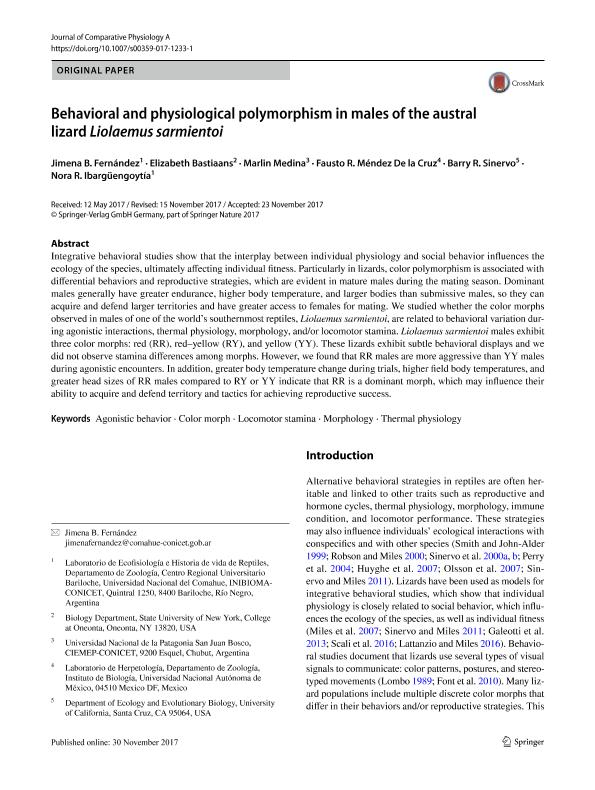Artículo
Behavioral and physiological polymorphism in males of the austral lizard Liolaemus sarmientoi
Fernandez, Jimena Beatriz ; Bastiaans, Elizabeth; Medina, Susana Marlin
; Bastiaans, Elizabeth; Medina, Susana Marlin ; Méndez de la Cruz, Fausto Roberto; Sinervo, Barry Raymond; Ibarguengoytía, Nora
; Méndez de la Cruz, Fausto Roberto; Sinervo, Barry Raymond; Ibarguengoytía, Nora
 ; Bastiaans, Elizabeth; Medina, Susana Marlin
; Bastiaans, Elizabeth; Medina, Susana Marlin ; Méndez de la Cruz, Fausto Roberto; Sinervo, Barry Raymond; Ibarguengoytía, Nora
; Méndez de la Cruz, Fausto Roberto; Sinervo, Barry Raymond; Ibarguengoytía, Nora
Fecha de publicación:
11/2017
Editorial:
Springer
Revista:
Journal Of Comparative Physiology A-sensory Neural And Behavioral Physiology
ISSN:
0340-7594
e-ISSN:
1432-1351
Idioma:
Inglés
Tipo de recurso:
Artículo publicado
Clasificación temática:
Resumen
Integrative behavioral studies show that the interplay between individual physiology and social behavior influences the ecology of the species, ultimately affecting individual fitness. Particularly in lizards, color polymorphism is associated with differential behaviors and reproductive strategies, which are evident in mature males during the mating season. Dominant males generally have greater endurance, higher body temperature, and larger bodies than submissive males, so they can acquire and defend larger territories and have greater access to females for mating. We studied whether the color morphs observed in males of one of the world’s southernmost reptiles, Liolaemus sarmientoi, are related to behavioral variation during agonistic interactions, thermal physiology, morphology, and/or locomotor stamina. Liolaemus sarmientoi males exhibit three color morphs: red (RR), red–yellow (RY), and yellow (YY). These lizards exhibit subtle behavioral displays and we did not observe stamina differences among morphs. However, we found that RR males are more aggressive than YY males during agonistic encounters. In addition, greater body temperature change during trials, higher field body temperatures, and greater head sizes of RR males compared to RY or YY indicate that RR is a dominant morph, which may influence their ability to acquire and defend territory and tactics for achieving reproductive success.
Archivos asociados
Licencia
Identificadores
Colecciones
Articulos(CIEMEP)
Articulos de CENTRO DE INVESTIGACION ESQUEL DE MONTAÑA Y ESTEPA PATAGONICA
Articulos de CENTRO DE INVESTIGACION ESQUEL DE MONTAÑA Y ESTEPA PATAGONICA
Articulos(INIBIOMA)
Articulos de INST. DE INVEST.EN BIODIVERSIDAD Y MEDIOAMBIENTE
Articulos de INST. DE INVEST.EN BIODIVERSIDAD Y MEDIOAMBIENTE
Citación
Fernandez, Jimena Beatriz; Bastiaans, Elizabeth; Medina, Susana Marlin; Méndez de la Cruz, Fausto Roberto; Sinervo, Barry Raymond; et al.; Behavioral and physiological polymorphism in males of the austral lizard Liolaemus sarmientoi; Springer; Journal Of Comparative Physiology A-sensory Neural And Behavioral Physiology; 204; 2; 11-2017; 219-230
Compartir
Altmétricas



